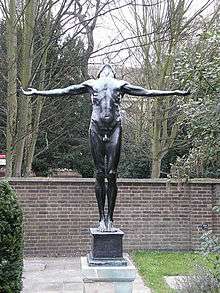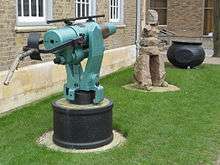Scott Polar Research Institute
 | |
| Established | 1920 |
|---|---|
| Director | Professor Julian A. Dowdeswell |
| Location |
Cambridge, United Kingdom (52°11′54.40″N 0°07′34.45″E / 52.1984444°N 0.1262361°E) |
| Website |
www |
The Scott Polar Research Institute (SPRI) is a centre for research into the polar regions and glaciology worldwide. It is a sub-department of the Department of Geography in the University of Cambridge, located on Lensfield Road in the south of Cambridge (52°11′54.40″N 0°07′34.45″E / 52.1984444°N 0.1262361°E).
Purpose
SPRI was founded in 1920 as the national memorial to Captain Robert Falcon Scott and his companions, who died on their return journey from the South Pole in 1912. It investigates issues relevant to the Arctic and Antarctic in the environmental sciences, social sciences and humanities. The institute has some 60 personnel, consisting of academic, library and support staff plus postgraduate students, associates and fellows attached to research programmes.[1]
The institute also hosts the secretariats of the International Glaciological Society and the Scientific Committee on Antarctic Research, and is part of the NERC Centre for Polar Observation and Modelling.

Resources
The Scott Polar Research Institute houses the world's most comprehensive polar library and archives.[2] The archives contain an unparalleled collection of manuscript material relating to the polar regions, research and exploration. For scientists and scholars, the library offers a collection developed since the 1920s covering all subjects relating to the Arctic, the Antarctic, and to ice and snow wherever found. For industry, it is a prime information source on such subjects as exploration and exploitation of natural resources and on the environmental implications of such activities in the polar regions; on the design of ice-strengthened shipping and selection of sea routes; and on problems of construction and transportation in cold environments. The library also offers an unrivalled resource for the needs of international relations and strategic defence.
The Picture Library contains a photograph collection from both the Arctic and Antarctic, mainly depicting the history of exploration in the polar regions, including much material from the expeditions of Scott and Shackleton. Its Thomas H. Manning Polar Archives are named in honour of the British-Canadian Arctic researcher, a university alumnus.[3] Its work includes an oral history programme which interviews people who have worked in the polar regions over the years. Due to high demand, the Polar Archives runs a booking scheme for anyone wishing to consult material.[4] The library is also home to the ICSU's World Data Centre for Glaciology, Cambridge (WDCGC), funded by the Royal Society.
The most recent addition to the library is the Shackleton Memorial Library, which in 1999 won a regional award from the Royal Institute of British Architects.[5] This part of the building holds much of the library's Antarctic collection, as well as some of its subject-based material.[6]
The library is part of the Inspire Libraries scheme[7] and is open to anyone with a polar interest to use for reference work and research.
The Polar Museum

SPRI operates the Polar Museum, which features artefacts (particularly from the heroic age of exploration), paintings, drawings, photographs (which includes cinematographic film, lantern slides, and daguerreotypes), and other material relating to polar history, exploration, science and art.
In 2010 the renovated Polar Museum opened its doors to the public. It now displays more of its collections than before. The new displays are based on the theme of exploration into science, emphasising both the history of exploration of the Arctic and Antarctic and the wider environmental significance of the poles in a changing world.
Art and artefacts from the people who call the Arctic home are displayed alongside the last letters of Captain Scott and iconic Antarctic photographs by Herbert Ponting. A series of exhibits shows how science is undertaken in the harsh conditions of the polar regions.
As well as these permanent exhibits, the Museum regularly hosts special exhibitions and shows of modern polar art. The Museum is open Tuesdays to Saturdays, admission is free.[8]
Outside the institute stands a monument of British oak to those who lost their lives in Antarctica in pursuit of science. It was unveiled on 12 May 2011 by the sculptor, Oliver Barratt and Roderick Rhys Jones (Chairman of the British Antarctic Monument Trust).[9] The monument represents the mould from which a stainless steel needle has been cast; the needle was erected at Stanley on the Falkland Islands.
The Museum is one of the eight museums which make up the University of Cambridge Museums consortium.[10]
Research
SPRI has several research groups.
Glaciology and Climate Change Group
This group's work involves quantifying the state of the cryosphere using remote sensing by satellites, plus accurate field measurements and computer simulations, to understand the processes in detail. In particular, the group has been able to observe the melting of the Larsen Ice Shelf, the rapid retreat of ice in western Antarctica, and increased summer melting in northern Canada. This work has contributed greatly to understanding climate change.
Glacimarine Environments Group
This group's work focuses on the dynamics of ice-sheets and delivery of sediment to the marine environment. The group uses geophysical and geological evidence gathered by icebreakers in the polar seas.
Polar Landscape and Remote Sensing Group
This group's work focuses on the processes which modify the polar and sub-polar environments, such as Arctic vegetation, and snow and ice cover. Improving techniques for measuring vegetation from satellite data is an important part of the work.
Polar Social Science and Humanities Group
This is an interdisciplinary group covering the anthropology, history and art of the Arctic. Its work includes looking at politics and environmental management in the polar regions, with particular expertise in the religion, culture and politics of the Russian North.
See also
- Scott Polar Research Institute's journal Polar Record
- British Antarctic Survey
- World Data Center
- National Snow and Ice Data Center
References
- ↑ Welcome to SPRI Scott Polar Research Institute. Accessed 2007-12-28.
- ↑ http://www.spri.cam.ac.uk/library/overview.html
- ↑ Kaufman, Michael T. (25 November 1998). "Thomas Manning, 86, Explorer Known as Lone Wolf of Arctic". The New York Times. Retrieved 2009-04-20.
- ↑ http://www.spri.cam.ac.uk/library/archives/
- ↑ The Shackleton Memorial Library Scott Polar Research Institute. Accessed 2007-12-28.
- ↑ Personal experience
- ↑ http://inspire-libraries.org.uk/participating-libraries/?task=view&id=1558
- ↑ Museum Polar Museum. Accessed 2010-6-9.
- ↑ "Antarctic Monument is unveiled in Cambridge". BBC News. Retrieved 2016-05-13.
- ↑ http://www.cam.ac.uk/museums-and-collections/visit-us/our-museums
External links
- World Data Centre for Glaciology, Cambridge
- portrait bust of explorer Duncan Carse by sculptor Jon Edgar, in SPRI public collection
- Department of Geography, University of Cambridge
- The Polar Museum
